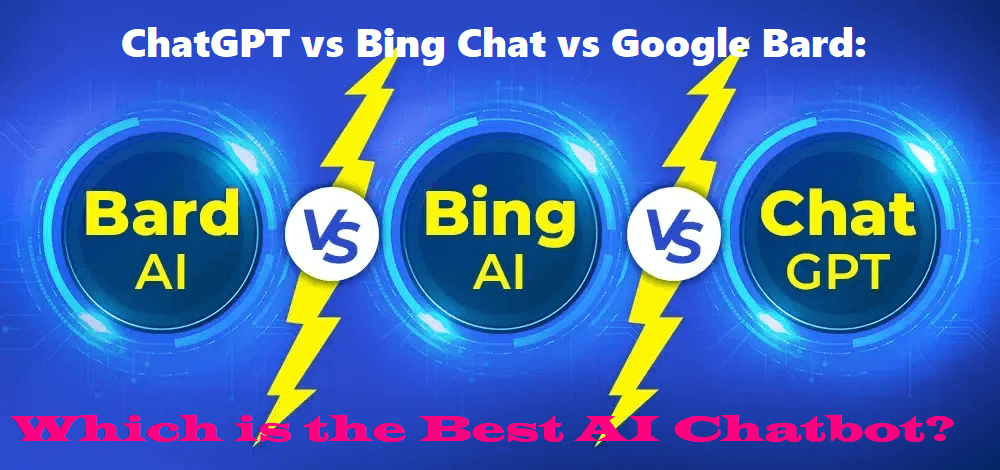Introduction
In today’s technologically advanced world, Artificial Intelligence (AI) has become a crucial aspect of our daily lives. Among various AI applications, chatbots have gained immense popularity due to their ability to provide instant responses and improve customer experiences. As more companies and developers seek to integrate chatbots into their platforms, the competition among AI-powered chatbots has intensified. In this article, we will compare three popular AI chatbot platforms: ChatGPT, Bing Chat, and Google Bard, to determine which one stands out as the best AI chatbot.
What are AI chatbots?
AI chatbots are computer programs that utilize artificial intelligence and natural language processing (NLP) to engage in human-like conversations with users. These chatbots are designed to answer questions, provide information, assist with tasks, and even simulate human-like emotions. The key advantage of AI chatbots is their ability to offer instant and accurate responses, enhancing user engagement and customer support experiences.
Introducing ChatGPT
How does ChatGPT work?
ChatGPT is a language model developed by OpenAI, which utilizes deep learning techniques to generate human-like responses to user queries. It is based on the GPT (Generative Pre-trained Transformer) architecture and has been fine-tuned to be a powerful conversational partner. ChatGPT is trained on a vast amount of diverse textual data, enabling it to provide coherent and contextually relevant answers.
Pros and Cons of ChatGPT
Pros:
- Impressive language understanding and response generation.
- High degree of customizability and adaptability for various applications.
- Integration with multiple platforms and APIs.
Cons:
- Occasional generation of inaccurate or nonsensical responses.
- Dependency on the quality of input data for optimal performance.
Exploring Bing Chat
Understanding Bing Chat’s functionality
Bing Chat is an AI chatbot service provided by Microsoft’s Bing search engine. It is designed to offer smart, conversational interactions with users and can be integrated into websites and applications. Bing Chat leverages Microsoft’s Cognitive Services and Azure Bot Service to deliver a seamless and interactive chatbot experience.
Pros and Cons of Bing Chat
Pros:
- Strong integration with Microsoft services and products.
- Robust NLP capabilities for understanding user intent.
- Scalable and suitable for large-scale deployments.
Cons:
- Limited customization options compared to other platforms.
- May require significant effort to integrate with non-Microsoft platforms.
Unveiling Google Bard
Google Bard’s capabilities and features
Google Bard is an AI chatbot developed by Google, which is equipped with advanced natural language processing and machine learning algorithms. It is designed to engage in meaningful conversations with users and can assist with tasks, answer questions, and provide personalized recommendations.
Pros and Cons of Google Bard
Pros:
- Powerful AI capabilities backed by Google’s expertise.
- Seamless integration with Google’s ecosystem and services.
- Constant updates and improvements through Google’s continuous development.
Cons:
- May lack the level of customization found in other AI chatbot platforms.
- Some users may find privacy concerns with Google’s data usage.
A Comparative Analysis
Natural Language Processing (NLP) capabilities
When comparing the NLP capabilities of ChatGPT, Bing Chat, and Google Bard, it is evident that all three chatbots exhibit impressive language understanding and response generation. However, ChatGPT stands out for its versatility and adaptability, allowing developers to fine-tune the model according to their specific needs. On the other hand, Bing Chat benefits from Microsoft’s extensive NLP research, enabling it to comprehend user intent effectively. Google Bard, being backed by Google’s expertise, also showcases robust NLP capabilities.
Customization and flexibility
In terms of customization and flexibility, ChatGPT shines as developers have the freedom to train the model on their own data, tailoring it to their domain and application. Bing Chat offers a certain degree of customization, but it may not match the level of control provided by ChatGPT. Google Bard, while powerful, may have some limitations in terms of customization options.
Integration with platforms
ChatGPT, Bing Chat, and Google Bard all boast strong integration capabilities, allowing developers to integrate them into various platforms and applications seamlessly. However, ChatGPT’s flexibility makes it more adaptable to different systems and services. Bing Chat is a solid choice for those already using Microsoft products, while Google Bard integrates effortlessly with Google’s ecosystem.
User experience and interface
The user experience and interface are critical aspects of any chatbot. ChatGPT’s responses often feel more natural and conversational, leading to a better user experience. Bing Chat and Google Bard both offer satisfactory user experiences, but users might find ChatGPT’s interactions more human-like.
Choosing the Best AI Chatbot
Selecting the best AI chatbot depends on the specific requirements of the application and the preferences of the developers. For those seeking high customizability and flexibility, ChatGPT emerges as the top choice. On the other hand, Bing Chat is a strong contender for businesses already utilizing Microsoft services, as it ensures smooth integration with existing systems. Google Bard is an excellent option for those within Google’s ecosystem, and it benefits from Google’s continuous updates and advancements.
Conclusion
In conclusion, the comparison between ChatGPT, Bing Chat, and Google Bard reveals that each AI chatbot has its unique strengths and weaknesses. ChatGPT stands out for its versatility and adaptability, offering extensive customization options. Bing Chat excels in its integration with Microsoft services and demonstrates strong NLP capabilities. Google Bard, backed by Google’s expertise, delivers impressive conversational experiences within Google’s ecosystem.
Regardless of the choice, AI chatbots are revolutionizing various industries by enhancing customer support, user engagement, and business efficiency. As technology progresses, we can expect continuous improvements in AI chatbot capabilities, providing users with even more advanced and sophisticated interactions.
FAQs
Are AI chatbots capable of understanding complex queries?
Can I use ChatGPT on my website?
Does Google Bard store user data?
Google Bard may store user data to improve the chatbot's performance and user experience, adhering to Google's data privacy policies.
Do AI chatbots have emotions?

